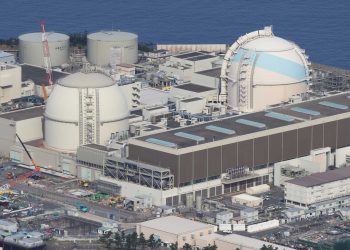,
Iran has failed to comply with a UN Security Council demand to halt uranium enrichment, the UN nuclear watchdog said, prompting calls around the world for new sanctions against Tehran.
The United States, which accuses Iran of seeking nuclear weapons, said international powers want to haul Iran back before the Security Council.
France called for a new sanctions resolution while fellow Security Council permanent member Britain called for “further Security Council measures, which will lead to the further isolation of Iran internationally.”
But Tehran insisted that it would not halt its nuclear work.
“Iran has not suspended its enrichment related activities,” the watchdog International Atomic Energy Agency said in a report for the IAEA's 35-nation board of governors and the Security Council that showed Iran actually increasing the scale of this work.
The Security Council passed a resolution on December 23 imposing limited sanctions on Iran and demanding it freeze enrichment, which makes fuel for civilian reactors but can also produce atom bomb material.
The council gave IAEA chief Mohamed ElBaradei 60 days to report on whether Iran had complied. The IAEA board is to meet on March 6.
ElBaradei's report said Iran had failed to cooperate on crucial issues that raise the possibility of a military dimension to Iran's work. Iran has failed to hand over a 15-page document outlining the plan for making the core of nuclear bombs, for instance.
A senior UN official said the lack of “progress in the outstanding issues is the most important thing in this report.”
The IAEA also demanded that Iran allow monitoring cameras at a huge, heavily bunkered underground enrichment site in Natanz, in central Iran.
The United States and its allies are now expected to urge new UN Security Council action against Iran.
“We are disappointed that Iran has not complied with (UN) resolution 1737,” said White House national security spokesman Gordon Johndroe.
State Department deputy spokesman Tom Casey said the failure “is going to leave us in a position of looking at next steps in the Council on how to proceed.”
US Secretary of State Condoleezza Rice said in Berlin after talks with the Russian, German and EU foreign ministers that world powers were agreed on the need to refer Iran back to the UN Security Council.
But in Madrid, Spanish Foreign Minister Miguel Angel Moratinos called for more talks, saying: “Diplomacy is never finished.”
Stronger sanctions could be opposed by Iranian allies and trading partners Russia and China, who as permanent members of the Security Council have the power to veto any resolution.
Iran has continued to build up its enrichment program in defiance of the world's calls for it to freeze strategic nuclear fuel work, according to the report.
The IAEA said Iran has now installed 328 centrifuges at a huge underground site at Natanz and is in the process of installing another 328 centrifuges, all in units of 164-centrifuge cascades, or production lines, at what is intended to be an industrial-level facility.
Iran is only actually enriching uranium at a pilot plant above-ground. This is in small amounts and at a level “below 5 percent U-235” — far below the 90 percent refinement for the U-235 isotope needed to make weapons, the IAEA said.
At the underground facility, heavily bunkered against possible air strikes, Iran is however already operating two of the 164-centrifuge cascades in test mode “under vacuum” and not with the feedstock uranium gas needed for enrichment, the report said, adding that its information was current as of February 17 when inspectors were last there.
But Iran brought in on January 31, 8.7 tons of the uranium gas, a sizeable amount and ready to be fed into the centrifuges.
Iran told the IAEA in January that it wanted to install up to 3,000 centrifuges underground and bring them into operation by May. It eventually seeks to have over 50,000 centrifuges, which could produce enough uranium to make at least 15 nuclear weapons a year.
Iran has blocked IAEA inspectors from installing cameras to monitor the centrifuges at the Natanz underground site, although there are cameras outside the hall where they are located.
A senior UN official said the centrifuges need to be monitored due to the growing scale of the Iranian work, although he said there is “no indication” the Iranians are close to having enough knowledge of enrichment to make nuclear weapons.
Iran cannot accept UN demands that it halt enrichment, a top official said in reaction to the report.
“Iran considers that a suspension of uranium would be contrary to its rights, to the Non-Proliferation Treaty and to international rules,” said Mohammad Saidi, deputy director of Iran's atomic energy agency.









